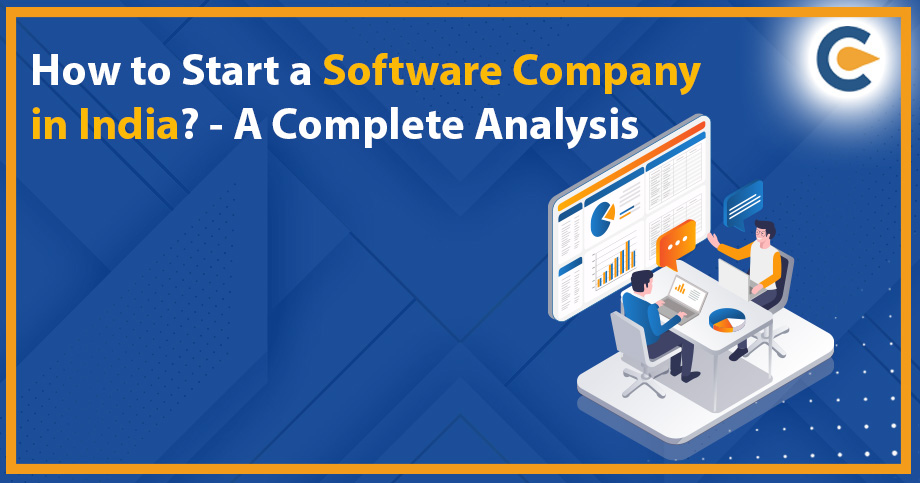India has seen a burgeoning growth in Software Companies in the past decade thanks to the start-up culture. The Indian start-up ecosystem is the third largest in the world and this trend shows no sign of dwindling down, as is clear from the number of start-ups steadily gaining “unicorn” status. Software companies generated up to $194 Billion in revenue and contributed to 8 % of India’s GDP[1] in the financial year 2021.
India provides a conducive environment for creating and establishing a Software Company, with the government providing a plethora of schemes and funding offers for existing or new businesses in the IT sector. However, the same involves also meeting a multitude of legal and regulatory requirements and procedures. This article aims to analyze the process involved in creating a software company, focusing more on statutory and regulatory compliances, registrations and other processes involved.
Types of Software Companies
There are majorly two types of software companies:
- Product or development-based software companies which specialize in creating software products for customer usage, like Google, Amazon, and Microsoft.
- Services or consulting-based software companies specialize in providing, inter alia, business consulting, outsourcing services, and engineering services like Infosys, TCS, and Wipro.
Processes involved in setting up a Software Company in India
Once the decision is made as to the niche area the software company would be carrying on its business in, it is requisite to follow some basic processes to ensure the smooth creation and running of the company.
- Type of Business
The first step involves deciding the type of software products or services, the targeted audience and how the product or service would function. Preparing a comprehensive business plan delineating the objects, guidelines, mode of functioning, growth plans, funding plans, staffing and marketing strategy, and other requisite information is helpful.
- Choosing The Type Of Entity
Depending on the requirement and objectives of the company and keeping in mind the legal implications, owners of the company ought to decide whether the company would be an LLP, private limited company or sole proprietorship.
- Funding
Funding is a major part of running any business. Entrepreneurs looking to start a software company ought to decide how they would generate funds and attract investors. One can go the traditional route of loans through banks or by approaching angel investors or venture capital firms.
- Registered Office
Having a registered office address is imperative for any company. Companies can choose the location and space according to the size and requirements of the company and apply to have the office registered with the RoC.
- Registration
There are many processes involved before a company can be registered in India. The Ministry of Corporate Affairs (MCA) website provides the medium for getting registered with the Registrar of Companies (RoC).
- All the directors and shareholders subscribed to the MOA and AOA are required to apply for digital signature certificates (DSC) to ensure that all required documents are legally attested. DSCs are imperative in ensuring a secure way to submit documents electronically in the registration process and are a prerequisite to filling out forms on the MCA website. Companies can acquire DSCs from agencies approved by the Controller of Certification Agencies (CCA). A DSC is generally valid for a period of two years.
- Every proposed director of the company is required to obtain a DIN (Director Identification Number) by filling out the DIR-3 form on the MCA website.
- Submission of relevant documents containing the Memorandum of Association (MOA), Articles of Association (AOA), and other relevant details, along with legal forms, are to be made to the RoC. The MOA contains all relevant information regarding the objectives of the company and its relationship with its shareholders. The AOA contains the rules and regulations for the internal management of the company.
- The next step lies in finding a distinctive name for the company and having the name registered with the Registrar of Companies (RoC). The company should reserve its name by providing two proposed names in Part-A of the SPICe+ form.
- The next step is applying for a Corporate Identification Number (CIN). After deciding whether the company is, inter alia, a sole proprietorship, private limited company or LLP, one can apply for the CIN, which is provided after registration and approval of the RoC. This is a unique identification number which can be used to monitor the activities of the company.
- The last step involves applying for PAN and TAN for the company.
- Once the above submissions are approved after verification, one can apply for a certificate of incorporation, and it is provided along with the PAN and TAN of the company.
- Licenses
After obtaining the requisite registrations, it is also important to obtain certain licenses. Obtaining Trademarks, Patent Registrations, Software Licenses, STPI are advisable. The STPI licenses are for software start-ups which provides them with a plethora of benefits and facilities like, inter alia, tax exemption for five years, exemption on export and import duty for products for a certain period, and obtaining office space at lower rates.
- Register As An Employer
The company owners need to register themselves as employers with the particular State Employment Department if the company wishes to hire employees.
- Register With A Software Technology Park
Companies can opt to register with Software Technology Park to receive tax benefits and various other incentives from the government.
- Strong Team
To run a software company, it is imperative to have an efficient tech team with talented coders and engineers, a good business team and a good marketing team, design professionals, and HR who can cater to various aspects of the running of the company. It is always prudent to have a robust and strong team of lawyers and advisors backing a software company to ensure smooth functioning.
- Business Software
Running a software company, one requires requisite software which can help track and monitor the functions, sales, HR activities, finances, and major projects and automate various operational functions. Having effective CRM software can help optimize business functions and facilitate the smooth functioning of the business.
- Business Insurance
Running a business always comes with its set of risks and liabilities, which can be caused by seen and unforeseen circumstances. It is always prudent to have IT business insurance to protect the company from potential loss, litigations, and other liabilities. Other insurances which software companies should look into are professional liability insurance or commercial property insurance which can protect against loss caused to property or any other similar liability or litigations from clients.
Conclusion
India is steadily becoming the hub of major revenue-generating software companies and the rising of the start-up culture is only fueling the development further. Software Companies are a major source of revenue for the country and create lakhs of jobs everywhere. It is a lucrative business setup for entrepreneurs and India provides a conducive environment for both the employers and employees of these companies to flourish. Setting up and running a software company is an interesting but daunting task and entrepreneurs should, amongst other things, should be mindful of the legal and regulatory requirements and various other compliances involved for the smooth running of the company.
Read Our Article:Registration of Software as Medical Device in India











